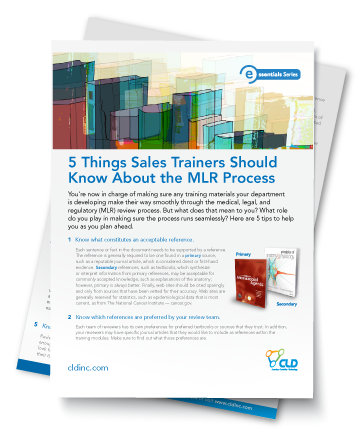Because pharmaceutical sales reps work in a highly technical, regulated industry, the training materials they use have to pass a stringent review process first. This process is called the Medical Legal Regulatory (MLR) or Promotional Review Committee (PRC). It ensures any promotion of a pharmaceutical product is medically accurate and complies with the regulations of the Food and Drug Administration (FDA) and any other applicable laws and regulations. Reviewers are experts in regulatory matters, legal issues, and medical affairs, and they ensure training is compliant in every respect.
The key to creating pharmaceutical sales training material that clears all these hurdles is a good working relationship between project managers and reviewers and an attitude on everyone’s part that everyone’s views should be heard. If you’re developing training materials, here are some ways to help smooth the MLR process.
Envision the Material from the Learner’s Point of View
Before submitting a piece of training material for review, think about how it fits into your training program. Training must be thorough, but if your review team knows that the bit you’re submitting is only one of several modules to come, it can prevent them from overzealously adding to the material. Let reviewers know, for example, that this particular module is designed to explain one aspect of training (such as the emotional impact a medical condition can have), and that other training modules headed for the review cycle provide all the factual knowledge that goes along with it.
Get The PDF Now! Download
Then Consider the Material from the Reviewer’s Point of View
When developing training material, keep in mind what the reviewers must look for. They have to know that the content is accurate, and supported by acceptable references. They need to see that the material focuses on what the trainee needs to know rather than extra facts that are good to know, but not essential. And reviewers need to understand that your content provides trainees with sufficient background information to help them integrate the new material and use it successfully on the job. Cover these bases during the material development phase, and you can be more confident that reviewers’ remarks and additions will add to its value.
Keep Track of Edits Already Made and Who Made Them
It may seem like too much effort to keep track of who made what changes during the review cycle, but this information can be valuable later on. For example, if the composition of the review team changes, new reviewers may not realize that something they flag in the material has already been discussed and resolved, and may suggest changes that have already been deemed unnecessary. With good version control on training documents, you can track the changes to the documents through time, and even annotate who made the changes. This keeps the entire team on the same page, so to speak, concerning what review steps are already completed.
New Call-to-action
Good Communication with Reviewers Ultimately Improves Pharmaceutical Sales Training
Finally, there is no substitute for strong communication between training materials developers and the review team. Developers should know what the review team considers as an acceptable reference, how citations should be formatted, and how the document tracking system works to keep up with all changes to training material. They should also allow sufficient time for reviewers to do their work by submitting materials when they say they will, and be prepared to ask for clarification concerning changes about which they are unsure. Good communications help ensure high-quality training materials that meet all requirements.
The MLR process is a step pharmaceutical trainers face that many other types of sales trainers do not, and it means developing materials may take longer and require more effort in the pharmaceutical industry than in other industries. By considering the trainee and the reviewer, keeping track of edits, and communicating clearly and regularly with reviewers, the process can move at a good pace without compromising the quality of training materials. If you’d like to know more about the nuts and bolts of getting through MLR, you can download a helpful report titled “5 Things Sales Trainers Should Know About the MLR Process.”






